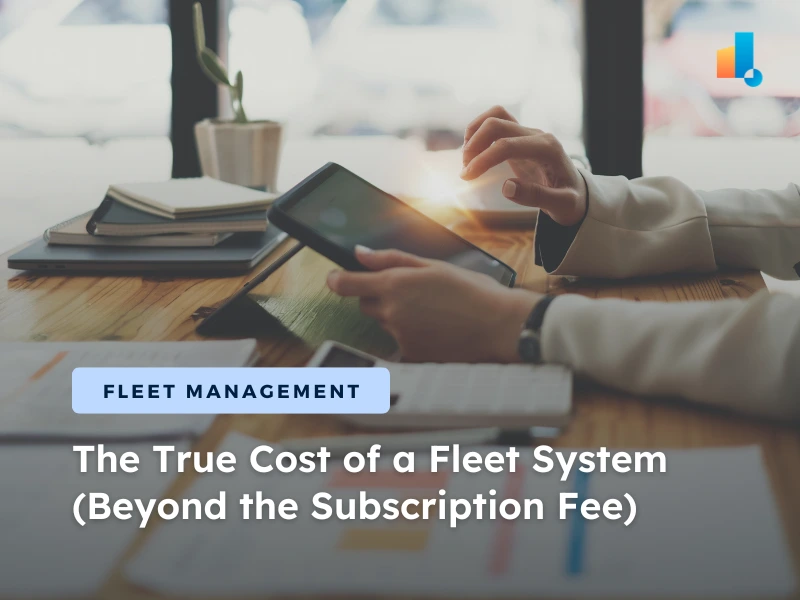Key Takeaways
- Fleet software costs often exceed base subscription fees by 20–40% in the first year due to onboarding, training, and premium support.
- Hidden charges like proration, module add-ons, and integration surcharges can inflate mid-contract costs unexpectedly.
- Professional services and downtime during rollout contribute significantly to operational overhead and lost productivity.
- Long-term expenses include maintenance, support, and data security risks, impacting total cost of ownership.
- Simply Fleet’s transparent, per-active-vehicle pricing model offers predictable costs and flexibility for fluctuating fleet sizes.
Q: What hidden fees should I budget for?
A: “Plan for a one-time onboarding fee equal to 10–15% of your annual subscription, premium support tiers at $500–$2,000/mo, professional services at $150–$300/hr, and integration surcharges of $100–$500 per connector.”
Signing up for fleet software can feel like a small line item, until the “optional” fees start rolling in. Between onboarding, training, multiple support tiers, custom integrations, and midterm prorations, your advertised subscription rate can easily balloon by 20%–40% in year one. Worse, many of these expenses hide in contract fine print or appear only when you need them most.
In this deep-dive, we’ll:
- Unpack every cost component, from per-vehicle licensing to premium services.
- Share firsthand anecdotes from small and midsize fleets facing unexpected bills.
- Provide a step-by-step Total Cost of Ownership (TCO) checklist and interactive calculator.
Whether you manage 10 trucks or 500 vehicles, this guide arms you with the insights to budget accurately, negotiate smarter, and sidestep sticker shock.
Subscription Fees Are Just the Starting Point
At a glance:
- Base subscription covers only per-vehicle licensing
- Onboarding, training, and basic support add 10–25%
- Premium support tiers can double your monthly outlay
Visible Costs: Per-Vehicle Licensing
Most vendors charge strictly by asset count. For example, Big Brand A’s entry tier starts at $35 per vehicle per month. A 50-vehicle operation pays $250/mo or $3,000/yr in base subscription, before any extras.
Hidden Onboarding and Training Expenses
- Onboarding fee: Typically 10–15% of your projected annual subscription spend; budgeting 12% helps absorb surprises.
- Training cost: Vendor-led workshops range from $200–$400/hr, often requiring 10–30 hours to cover admin, dispatch, and driver modules.
- Unscheduled Sessions: Need weekend or off-hours training? Plan for a 20–30% premium.
- Tip from the Field: “We budgeted $5K for training but hit $8K when we needed weekend and remote sessions.” – Regional Hauling Co.
Premium Support Tiers
Basic email support often includes a 24–48 hour response window. For faster SLAs, like 4-hour phone support, expect silver or gold plans priced at $500–$2,000/mo for 10 vehicles. Review your incident volume: paying for quicker response makes sense if you handle 20+ support tickets monthly.
Contract Traps and Penalties
Long-term contracts (24–36 months) lock in rates but can include auto-renew clauses and midterm caps. Renewal spikes of 10–20% are common if your vehicle count exceeds initial estimates.
- Cap Increase Clause: Negotiate a clause allowing modest vehicle additions (e.g., +10%) without penalty.
- Early Termination Fees: Understand buyout costs in case the solution fails to meet expectations.
Hardware Costs
Hardware like GPS trackers or ELD devices can cost $50–$200 each, with a 50-vehicle fleet facing $2,500–$10,000 in upfront costs. Factor this into your initial budget to avoid surprises.
Pricing Structures That Can Surprise You
At a glance:
- Tiered slabs trigger at specific fleet sizes (e.g., 1–50, 51–100)
- Add-on modules sit beyond core subscription
- Proration rules can inflate midterm additions
Fleet Size Slabs and Breakpoints
Vendors group fleets into breakpoints—1–50, 51–100, 101–200. Crossing from 50 to 51 vehicles not only moves you to a higher slab rate but often applies that higher rate retroactively across all assets.
Module Add-On Fees
Proration Charges for Midterm Changes
Adding vehicles or modules mid-contract often triggers proration at the higher slab rate for the remaining term.
- Example: On a $30,000 annual plan for up to 50 vehicles, adding 5 vehicles in July could prorate at $50/vehicle for six months—adding $1,500 on top of your existing fees.
Operational Overhead You Can’t Ignore
At a glance:
- Paying for unused features adds cost without value
- Time spent on software workarounds equals lost revenue
- Professional service fees can add 20–30% to rollout costs
Feature Bloat: Tools You Won’t Use
A typical fleet solution offers 30+ features; many midmarket fleets actively use fewer than 15. Paying for modules like parts procurement or advanced analytics you don’t need wastes budget and complicates training.
Downtime and Hidden Labor Costs
Every hour spent troubleshooting is an hour of unbilled or diverted labor. At $50/hr tech rate, 5 user errors per week equal $1,000–$1,250/month in monthly lost productivity.
- Pro Warning: Track your support tickets and error resolution times to quantify this cost.
Customization and Professional Services Fees
Out-of-the-box workflows seldom match every operation. Consultants charge $150–$300/hr for customization, data migrations, and advanced reporting. Expect to budget 20–40 hours (e.g., $3,000–$10,000) for initial rollout, plus ongoing tweaks.
Productivity Loss During Transition
Transitions can reduce productivity by 20–30%, with 40% fewer dips through training. Use phased rollouts and KPIs to cut losses by 15%.
Long-Term Implications and Indirect Costs
These costs evolve over time, impacting your budget beyond the first year.
Maintenance and Support Fees: Regular maintenance can add a significant percentage to annual costs. Anticipate potential increases as your fleet grows or technology updates.
Data Security Risks: Security breaches pose major financial risks due to lost data and fines. Proactive measures can reduce vulnerabilities and protect operations.
Productivity and Cultural Impacts: Transitions may temporarily reduce efficiency due to learning curves. Engaging staff early helps overcome resistance and boost adoption.
Subscription Model Considerations: Recurring fees offer flexibility but can exceed one-time costs long-term. Evaluate scalability and feature updates to optimize savings.
Pre-Purchase TCO Checklist
- Estimate onboarding hours × your blended support rate
- Identify slab thresholds, proration triggers & cap increase clauses
- Factor in renewal rate caps or escalation clauses
- List every add-on, integration, and its unit cost
- Model scenarios with differing fleet sizes (10, 50, 100 vehicles)
- Test “what-if” migrations or temporary asset spikes
Q. Can I calculate my own TCO?
A. Yes, watch our tutorial on how to calculate your own TCO
Simply Fleet as Your Lean Alternative
At a glance:
- Essential plan: $2 per vehicle per month ($10 monthly minimum) for all core features
- Advanced plan: $4 per vehicle per month ($20 monthly minimum) adds work orders, inventory management, telematics integrations, and priority support
- Annual billing: Save two months (Effective rates: $20 or $40 per vehicle per year)
- Enterprise fleets (100+ vehicles): Custom pricing and bulk discounts available, contact sales
Essential Plan
$2/vehicle/mo ($10 minimum for 5 vehicles)
Includes:
- Preventive maintenance scheduling
- Fuel, service, and expense logging
- Digital inspections with unlimited photo uploads
- Asset and user management
- Trip logging and mileage tracking
Advanced Plan
$4/vehicle/mo ($20 minimum for 5 vehicles)
Everything in Essential, plus:
- Work order creation and assignment
- Parts and inventory management
- Telemetry integrations (e.g., Geotab, Samsara, Verizon Connect)
- Priority email and chat support
- Advanced reporting and data exports
Annual Billing Discount
Choose yearly billing and get two months free:
- Essential: $20 per vehicle per year ($100 minimum for 5 vehicles)
- Advanced: $40 per vehicle per year ($200 minimum for 5 vehicles)
Enterprise & Bulk Discounts
For fleets over 100 vehicles, Simply Fleet offers custom enterprise packages with volume pricing, dedicated onboarding services, and tailored support SLAs. Reach out to our sales team to design a plan that fits your scale and budget.
A fleet manager recently reported an issue with a previous system that charged a fixed monthly rate, even for vehicles no longer in use, a challenge many face with fluctuating fleets. This led to overpayments and strained cash flow, prompting a search for a better solution. Switching to Simply Fleet, which only charges per active vehicle and adjusts costs if the fleet shrinks, brought them relief and better control over their budget. This kind of flexibility can save time and money, showing how the right choice can align with real-world needs.
Conclusion
Navigating fleet software pricing demands scrutiny of every contract clause and cost center. From the first license to the final renewal, hidden fees lurk in onboarding, support tiers, proration triggers, and add-on modules. Use our expanded TCO checklist, interactive calculator, and real-world scenarios to forecast your expenses accurately and negotiate fair terms. When you’re ready to eliminate the guesswork, Simply Fleet’s all-inclusive, flat-rate offering ensures predictable budgeting and operational continuity. Your fleet deserves a partner that’s transparent and aligned with your bottom line, no surprises attached.
Ready to see your real costs?
Learn How To Calculate Fleet TOC | Compare Features in Depth | Fleet Maintenance Best Practices
Start with Simply Fleet today, keep your budget precise and your fleet running smoothly.



.png)








.png)


.png)









